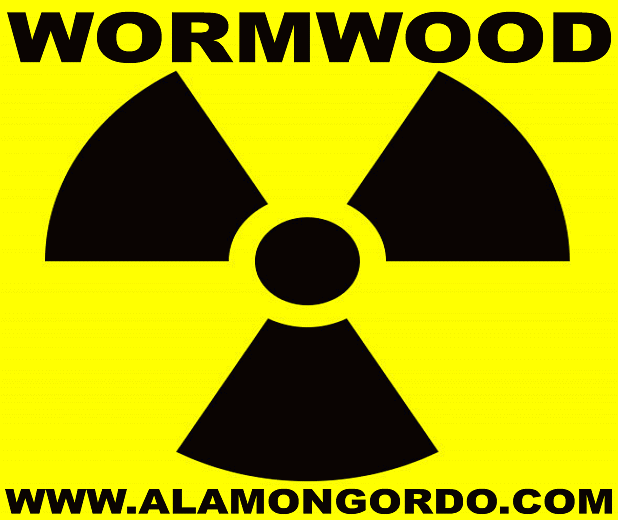REVELATION 8 Verse 11
The name of the star is called “Wormwood.” One third of the waters became wormwood. Many people died from the waters, because they were made bitter.
What is Wormwood ?
Thats easy : Wormwood is nuclear RADIATON ! There are several signs that The Bible predicts that our waters and rivers will become “bitter” by nuclear radiation. Wormwood Forest is the former name of the Red Forest in Ukraine (Tjernobyl). So BEFORE the Tjernobyl disaster happened, the name of this forrest was WORMWOOD, this is a clear signs that the prophecy in Revelation, The Bible warns us that our water will be made bitter due to RADIATION !!!
The Red Forest (Ukrainian: Рудий ліс, Rudyi lis, literally “ginger-color forest”) is the 10-square-kilometre (4 sq mi) area surrounding the Chernobyl Nuclear Power Plant within the Exclusion Zone. The name “Red Forest” comes from the ginger-brown colour of the pine trees after they died following the absorption of high levels of radiation from the Chernobyl accident on 26 April 1986.
In the post-disaster cleanup operations, the Red Forest was bulldozed and buried in “waste graveyards”. The site of the Red Forest remains one of the most contaminated areas in the world today. The explosion and fire at the Chernobyl No. 4 reactor contaminated the soil, water and atmosphere with radioactive material equivalent to that of 20 times the atomic bombings of Hiroshima and Nagasaki.
When you know that the Fukushima disaster was much, much worse that the Tjernobyl disaster … You know our waters are mage BITTER !!! One of the “False Prophets” in The Bible (THE MEDIA) won’t tell you about it because when they tell you about it, the Economic System (BEAST) will collapse and “The ELITE” will lose everything…
Biblical WormWood and Radiation Research
- Chernobyl and Chornobyl are Russian and Ukranian words meaning literally “black stalks”, referring to artemisia vulgaris – four-foot high grassy plants known in English as mugwort or “common wormwood”.
- Chornobyl was the Ukranian city lending its name to the reactor.
- Wormwood, according to a 1984 Merriam-Webster Dictionary is Artemisia, esp. Artemisia absinthium. The definition explicitly encompasses all varieties of Artemisia.
- Mugwort (Artemisia Vulgaris) is closely related to artemisia absinthium, both genetically and in physical appearance.
- Curiously, mugwort was not listed in the Merriam-Webster dictionary of nearly 160,000 words, underscoring the fact that it is best known as “common wormwood”.
- Prior to 1986 both Russian and Ukranian dictionaries included wormwood as a secondary definition for chernobyl / chornobyl and some Internet translators still translate chernobyl into wormwood.
- Wormwood acquired its name because of its ability to act as a “de-wormer” (i.e., expelling intestinal worm infestations). The de-worming ability extends throughout various artemisia species.
- Polyn in Ukrainian or in Russian) is the primary term in Russian for artemisia absinthium or wormwood.
- Pelyn is the Czech name for artemisia vulgaris (i.e., mugwort) and translates literally as wormwood vulgaris, thus helping to explain the relationship between and origins of both polyn’ and chernobyl.
- Perhaps the most observable difference between mugwort and wormwood is whether the stalks are green or whether the stalks are dark green.
- Apsinthos
 , the Greek word found in the earliest surviving Revelation manuscripts, means “bitter like wormwood”. Although often used to describe artemisia absinthia, “wormwood” is not an exact literal translation.
, the Greek word found in the earliest surviving Revelation manuscripts, means “bitter like wormwood”. Although often used to describe artemisia absinthia, “wormwood” is not an exact literal translation. - Historical translations include “Bitter” from the 1969 Worldwide English New Testament and “Wormwood (footnote – that is, Bitter)” from the 1973, 1984 New International Version of the Bible. Both of these predate the Chernobyl meltdown.
- The world’s oldest surviving Bible, the Codex Sinaiticus uses the Greek name Apsinthion
 , a broadly encompassing term meaning “of the nature of absinthia. (Note: Some claim there is evidence of this word having been changed from Apsinthos.)
, a broadly encompassing term meaning “of the nature of absinthia. (Note: Some claim there is evidence of this word having been changed from Apsinthos.) - Only one of the many apocalyptic events described in Revelation was assigned a proper noun as a name (an obscure name at that).
- As with English, both the Greek and Aramaic words for star have multiple meanings.
- The Greek word; means not only star and famous, but also strewn over the sky – fitting terminology for the Chernobyl explosion and radioactive fallout which heavily contaminated thousands of square miles of land in the Ukraine, Belarus and Russia, much of which will be uninhabitable for thousands of years.
- An ever-increasing body of evidence suggests that the New Testament may have been originally written in Aramaic (i.e., the language Mel Gibson used in “Passion of the Christ”) rather than Greek. The Aramaic word for star, kwkb, can be both noun and verb – for example, to be made a star, an interesting association since that definition applies literally to what happened at Chernobyl.
The third angel sounded his trumpet, and a great star, blazing like a torch,
fell from the sky on a third of the rivers and on the springs of water—
the name of the star is Wormwood. A third of the waters turned bitter,
and many people died from the waters that had become bitter.




